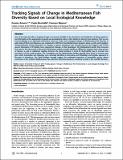Por favor, use este identificador para citar o enlazar a este item:
http://hdl.handle.net/10261/53379COMPARTIR / EXPORTAR:
 SHARE SHARE
 CORE
BASE CORE
BASE
|
|
| Visualizar otros formatos: MARC | Dublin Core | RDF | ORE | MODS | METS | DIDL | DATACITE | |

| Campo DC | Valor | Lengua/Idioma |
|---|---|---|
| dc.contributor.author | Azzurro, Ernesto | - |
| dc.contributor.author | Moschella, Paula | - |
| dc.contributor.author | Maynou, Francesc | - |
| dc.date.accessioned | 2012-07-17T06:49:02Z | - |
| dc.date.available | 2012-07-17T06:49:02Z | - |
| dc.date.issued | 2011-09-22 | - |
| dc.identifier.citation | PLoS ONE 6(9): e24885 (2011) | es_ES |
| dc.identifier.issn | 1932-6203 | - |
| dc.identifier.uri | http://hdl.handle.net/10261/53379 | - |
| dc.description | 8 pages, 4 figures, 4 tables | es_ES |
| dc.description.abstract | One of the expected effects of global change is increased variability in the abundance and distribution of living organisms, but information at the appropriate temporal and geographical scales is often lacking to observe these patterns. Here we use local knowledge as an alternative information source to study some emerging changes in Mediterranean fish diversity. A pilot study of thirty-two fishermen was conducted in 2009 from four Mediterranean locations along a south-north gradient. Semi-quantitative survey information on changes in species abundance was recorded by year and suggests that 59 fish species belonging to 35 families have experienced changes in their abundance. We distinguished species that increased from species that decreased or fluctuated. Multivariate analysis revealed significant differences between these three groups of species, as well as significant variation between the study locations. A trend for thermophilic taxa to increase was recorded at all the study locations. The Carangidae and the Sphyraenidae families typically were found to increase over time, while Scombridae and Clupeidae were generally identified as decreasing and Fistularidae and Scaridae appeared to fluctuate in abundance. Our initial findings strongly suggest the northward expansion of termophilic species whose occurrence in the northern Mediterranean has only been noted previously by occasional records in the scientific literature | es_ES |
| dc.description.sponsorship | This study has been partially supported by the CIESM/Albert II Foundation (Project: Tropical signals) and by the Euro-Mediterranean Center for Climatic Change and the Italian Ministry for the Environment and the Territory (Project: The impacts of biological invasions and climate change on the biodiversity of the Mediterranean Sea). The funders had no role in study design, data collection and analysis, decision to publish, or preparation of the manuscript | es_ES |
| dc.language.iso | eng | es_ES |
| dc.publisher | Public Library of Science | es_ES |
| dc.relation.isversionof | Publisher's version | - |
| dc.rights | openAccess | es_ES |
| dc.title | Tracking Signals of Change in Mediterranean Fish Diversity Based on Local Ecological Knowledge | es_ES |
| dc.type | artículo | es_ES |
| dc.identifier.doi | 10.1371/journal.pone.0024885 | - |
| dc.description.peerreviewed | Peer reviewed | es_ES |
| dc.relation.publisherversion | https://doi.org/10.1371/journal.pone.0024885 | es_ES |
| dc.identifier.e-issn | 1932-6203 | - |
| dc.identifier.pmid | 21966376 | - |
| dc.type.coar | http://purl.org/coar/resource_type/c_6501 | es_ES |
| item.openairetype | artículo | - |
| item.grantfulltext | open | - |
| item.cerifentitytype | Publications | - |
| item.openairecristype | http://purl.org/coar/resource_type/c_18cf | - |
| item.fulltext | With Fulltext | - |
| item.languageiso639-1 | en | - |
| Aparece en las colecciones: | (ICM) Artículos | |
Ficheros en este ítem:
| Fichero | Descripción | Tamaño | Formato | |
|---|---|---|---|---|
| Azzurro_et_al_2011.pdf | 442,84 kB | Adobe PDF |  Visualizar/Abrir |
CORE Recommender
PubMed Central
Citations
14
checked on 06-abr-2024
SCOPUSTM
Citations
160
checked on 15-abr-2024
WEB OF SCIENCETM
Citations
139
checked on 28-feb-2024
Page view(s)
310
checked on 18-abr-2024
Download(s)
207
checked on 18-abr-2024
Google ScholarTM
Check
Altmetric
Altmetric
Artículos relacionados:
NOTA: Los ítems de Digital.CSIC están protegidos por copyright, con todos los derechos reservados, a menos que se indique lo contrario.
